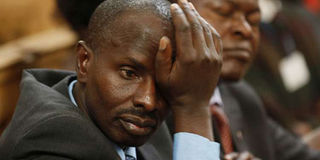Kuppet wins in membership row with Knut

Kenya National Union of Teachers (Knut) Secretary-General Wilson Sossion. Knut has suffered a setback after it was ordered to stop representing teachers in secondary schools. PHOTO | FILE | NATION MEDIA GROUP
What you need to know:
- A conciliator appointed by the Labour ministry, said Knut and Kuppet represented teachers with different interests.
- Knut will focus on primary school teachers.
- The conciliator has recommended that the commission and Knut begin talks to align their agreement with regard to industrial relations and representation of teachers.
Kenya National Union of Teachers (Knut) has suffered a setback after it was ordered to stop representing teachers in secondary schools.
Instead, its rival Kenya Union of Post-Primary Education Teachers (Kuppet) will represent them. Knut will focus on primary school teachers.
A conciliator, J N Mwanzia, appointed by the Labour ministry, said the two unions represented teachers with different interests.
This follows Kuppet’s protest to Labour Cabinet Secretary Phyllis Kandie that Knut, whose secretary-general is Wilson Sossion, was poaching its members, leading to overlap, confusion and chaos thus compromising their ability to effectively deliver service.
“It is our finding that despite the fact that, both unions are registered entities with recognition agreements with the Teachers Service Commission, a case for demarcation exists,” ruled Mr Mwanzia.
He added that statistics from commission indicated that Kuppet had 46,048 members in secondary schools while Knut had 17,932 out of its 82,775 members as at January.
The conciliator has recommended that the commission and Knut begin talks to align their agreement with regard to industrial relations and representation of teachers.
COLLECTIVE BARGAINING AGREEMENTS
“Kuppet and other relevant unions should be consulted during such engagements. However, Kuppet being the complainant deserves the right to petition the commission for the scheduling of such a meeting if the commission and Knut do not do so within a reasonable time,” said Mr Mwanzia.
This is contained in a report to the chief industrial relations officer dated February 17.
The outcome of such negotiations, he said, ought to take into account current collective bargaining agreements signed between the commission and each party.
“Parties are requested to accept the recommendations as the basis of resolving the dispute,” he added.
Kuppet filed its application on September last year and a conciliator was appointed in November to whom both parties made their submissions. Kuppet had argued that attempts to clearly demarcate the boundaries of representation by both unions had been unsuccessful.
“Teachers within post-primary learning institutions needed to have their interests effectively represented, something which has not been there as Knut had objected to Kuppet’s registration,” it added.
Knut argued that representation of teachers was on voluntary basis and all those under its membership had a right to choose. “This right to freely belong to a union is one’s choice and is recognised by Kuppet in their recognition agreement,” said Knut.




